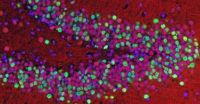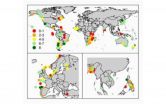EARTH -- OPEC and oil: The next 50 years
2011-01-06
(Press-News.org) Alexandria, VA – Over the past five decades, OPEC has earned a reputation for being a powerful cartel that controls the world's oil production and prices - but there are limits to OPEC's influence and wealth. In fact, many OPEC countries face grave problems, which are to some extent the result of their oil-income dependence. EARTH examines OPEC's past, current and future place in this world. Will OPEC continue to control the planet's oil for the next 50 years?
Learn more about this eye-opening subject in February's featured article "OPEC and Oil: The Next 50 Years," and read other analytical stories on topics such as dinosaur origins, tracing nuclear weapons using bomb debris, and reconsidering the economic implications of climate change, all in the February issue.
These stories and many more can be found in the February issue of EARTH, now available digitally (http://www.earthmagazine.org/digital) or in print on your local newsstands.
INFORMATION:
For further information on the February featured article, go to http://www.earthmagazine.org/earth/article/3e8-7db-1-3.
Keep up to date with the latest happenings in earth, energy and environment news with EARTH magazine, available on local newsstands or online at http://www.earthmagazine.org/. Published by the American Geological Institute, EARTH is your source for the science behind the headlines.
END
ELSE PRESS RELEASES FROM THIS DATE:
2011-01-06
Dr. Emil Kozarov and a team of researchers at the Columbia University College of Dental Medicine have identified specific bacteria that may have a key role in vascular pathogenesis, specifically atherosclerosis, or what is commonly referred to as "hardening of the arteries" – the number one cause of death in the United States.
Fully understanding the role of infections in cardiovascular diseases has been challenging because researchers have previously been unable to isolate live bacteria from atherosclerotic tissue. Using tissue specimens from the Department of Surgery ...
2011-01-06
PHILADELPHIA – Lou Gehrig's disease, or amyotrophic lateral sclerosis (ALS), and frontotemporal lobar degeneration (FTLD) are characterized by protein clumps in brain and spinal-cord cells that include an RNA-binding protein called TDP-43. This protein is the major building block of the lesions formed by these clumps.
In a study published in the Journal of Clinical Investigation, a team led by Virginia M.-Y. Lee, PhD, director of Penn's Center for Neurodegenerative Disease Research, describes the first direct evidence of how mutated TDP-43 can cause neurons to die. Although ...
2011-01-06
A team led by Patrick T. Mather, director of Syracuse Biomaterials Institute (SBI) and Milton and Ann Stevenson professor of biomedical and chemical engineering in Syracuse University's L.C. Smith College of Engineering and Computer Science (LCS), has succeeded in applying the concept of functionally graded materials (FGMs) to shape memory polymers (SMPs).
SMPs are a class of "smart" materials that can switch between two shapes, from a fixed (temporary) shape to a predetermined permanent shape. Shape memory polymers function as actuators, by first forming a heated article ...
2011-01-06
The oceans became oxygen-rich as they are today about 600 million years ago, during Earth's Late Ediacaran Period. Before that, most scientists believed until recently, the ancient oceans were relatively oxygen-poor for the preceding four billion years.
Now biogeochemists at the University of California-Riverside (UCR) have found evidence that the oceans went back to being "anoxic," or oxygen-poor, around 499 million years ago, soon after the first appearance of animals on the planet.
They remained anoxic for two to four million years.
The researchers suggest that ...
2011-01-06
CHAMPAIGN, Ill. — In one University of Illinois lab, invisibility is a matter of now you hear it, now you don't.
Led by mechanical science and engineering professor Nicholas Fang, Illinois researchers have demonstrated an acoustic cloak, a technology that renders underwater objects invisible to sonar and other ultrasound waves.
"We are not talking about science fiction. We are talking about controlling sound waves by bending and twisting them in a designer space," said Fang, who also is affiliated with the Beckman Institute for Advanced Science and Technology. "This ...
2011-01-06
The bulk of the world's fisheries--including the kind of small-scale, often non-industrialized fisheries that millions of people depend on for food--could be sustained using community-based co-management. This is the conclusion of a study reported in this week's issue of the journal Nature.
"The majority of the world's fisheries are not--and never will be--managed by strong centralized governments with top-down rules and the means to enforce them," says Nicolas Gutiérrez, a University of Washington fisheries scientist and lead author of the Nature paper.
"Our findings ...
2011-01-06
Boston, MA -- The deaths of 1.8 million female infants and children in India over the past 20 years are related to domestic violence against their mothers, according to a new study led by researchers at the Harvard School of Public Health (HSPH). In their examination of over 158,000 births occurring between 1985 and 2005, the researchers found that husbands' violence against wives increased the risk of death among female children, but not male children, in both the first year and the first five years of life.
"Being born a girl into a family in India in which your mother ...
2011-01-06
ROCHESTER, Minn. -- Mayo Clinic researchers have determined the lifetime risk of developing rheumatoid arthritis and six other autoimmune rheumatic diseases for both men and women. The findings appear online in Arthritis and Rheumatism.
VIDEO ALERT: Additional audio and video resources, including excerpts from an interview with Cynthia Crowson describing the research, are available on the Mayo Clinic News Blog(http://newsblog.mayoclinic.org/2011/01/05/whats-your-risk-of-developing-rheumatoid-arthritis/)
"We estimated the lifetime risk for rheumatic disease for both ...
2011-01-06
COLUMBUS, Ohio – Most people like to play it safe when combining colors for an article of clothing or outfit, a new study suggests.
When consumers were asked to choose colors for seven different parts of an athletic shoe, they tended to pick identical or similar colors for nearly every element.
They usually avoided contrasting or even moderately different color combinations.
A red and yellow athletic shoe? Not going to happen. Blue and grey? That's more like it.
This is one of the first studies to show how consumers would choose to combine colors in a realistic ...
2011-01-06
An international team of physicists and neuroscientists has reported a breakthrough in magnetic resonance imaging that allows brain scans more than seven times faster than currently possible.
In a paper that appeared Dec. 20 in the journal PLoS ONE, a University of California, Berkeley, physicist and colleagues from the University of Minnesota and Oxford University in the United Kingdom describe two improvements that allow full three-dimensional brain scans in less than half a second, instead of the typical 2 to 3 seconds.
"When we made the first images, it was unbelievable ...
LAST 30 PRESS RELEASES:
[Press-News.org] EARTH -- OPEC and oil: The next 50 years




